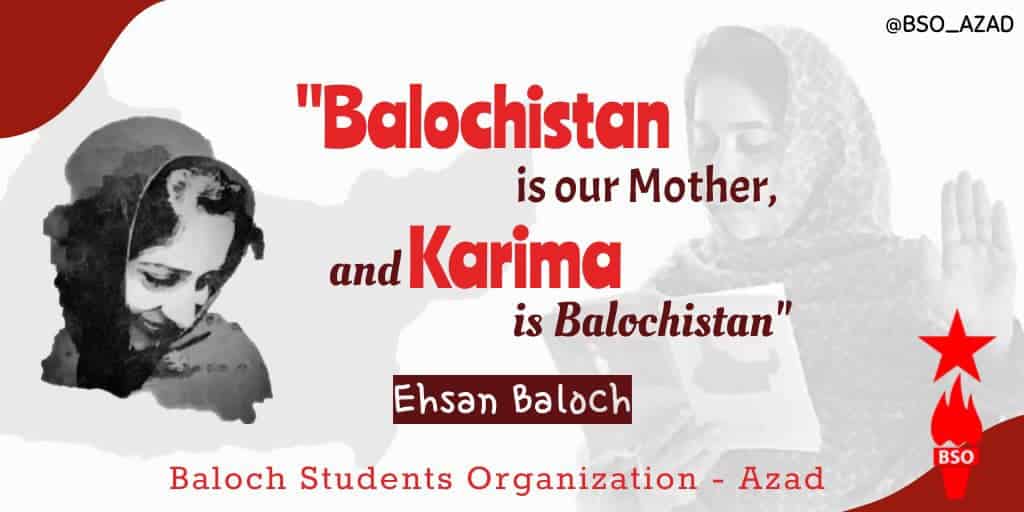“Balochistan is our Mother, and Karima is Balochistan”
Ehsan Baloch
The journey to shackle the societal norms, although deluded with colonial heights, at a time when they are at their peak, is easy to speak of but hard to move on practically. Once, a girl said so, too. And then she followed what she said. Fearlessly, boldly and courageously. She was leading with all her energy and enthusiasm.
Time got brutal, but she was still leading. When her organizational Sangats were abducted, she continued to move forward. Then their mutilated bodies were thrown, yet, She continued on the path of liberation. She was suggested and warned to take refuge in foreign. She refused. And then, when the organization decided that she would move, she resisted not because Karima did not decide her fate. It was the organization, the movement since there was nothing in her of herself but the organization, the cause and Balochistan.
Banuk Karima Baloch was born in Dubai (1983) but returned to her homeland, which longed for her desperately. She belonged to a revolutionary family who had already birthed brave sons like Dr. Khalid Baloch. Getting early socialization at home, she joined the journey to a brighter national future in 2005. She was alone but bold. She feared none, neither the state nor the brutal abuses of her society in the name of imported norms.
With her active role in BSO-Azad in her early years, she soon emerged in the organization and the movement. She led the women’s wing of BSO in the early days but vanished soon after when they found it suitable to work collectively for the collective cause. After all, it was this collectiveness they needed. And then we witnessed the best era of the Baloch movement when girls and women across Balochistan were shoulder to shoulder with their counterparts against the common enemy, the common dirt – Pakistan. That was a revolution the Baloch movement had dreamt of. Karima had dreamt of.
In movements as of Baloch, you need collectiveness, unity, strength, hope, courage, inspiration, aspiration, willingness, seriousness, learning, teaching and etcetera. Karima had all. For her, the organization meant more than her life, wishes, and family. When the organization sent her abroad in 2015, Pakistani forces took her uncle into custody. For the safe release of her uncle, the Pakistani Intelligence Agencies asked Karima to quit her struggle. “You have taken Karima’s uncle while the person voicing for her people abroad is the organizational member of BSO,” she told them. In response, her uncle was martyred. That did not weaken her.
Soon after, her home was bombarded, and the forces harassed her family and burnt their house. Her organization was banned. Her closest ones disappeared and were killed. She was tormented in every possible way, but She was the Karima and remained Karima until she breathed her last on December 21st, 2020.
Disappearances, killings, abusing and torturing had no significance for her because she had served herself for the greater cause of the nation – the independence of her land from the scavengers. And she continued to raise her voice. Sometimes for her Lakko (Shabbir Baloch), sometimes for her chairmen (Zakir Majeed and Zahid Baloch), for Baloch students, and sometimes for Baloch women. Gradually, she appeared to be the face of Balochistan in national and international communities. “Balochistan is our mother, and Karima is Balochistan,” one of her companions wrote on Twitter.
Karima is an inspiration to many because she challenged societal norms, while others respect her for her radical ideology for the Baloch movement. Yes. Karima was a revolutionary because she paved the way for girls to join the Baloch movement and lead the students and the masses. She did not care if it were days or nights, Tump or Shaal, hot or cold, but she cared the most for her cause, her Baloch nation, her languages, and her Balochistan. And today, Karima is the Balochistan of the whole nation. “Ideological presence fuels more strengths and commitment than physical.” And Karima has become the ideology of the nation.
She knew she, too, would be killed. But had she quit because she was in threat of death? Had she quit because she was abused? Had she quit because her family was affected? Was she to prioritize her family more than her nation? She feared none of the above and became the Lumma of the nation. She is Karima. She is Lumma. From none to the spotlight of history, Karima has shown the entire world: “Down with Colonialism. Down with Imperialism. Down with Pakistan.”
On the occasion of Baloch Women’s Day and our Lumma’s martyrdom anniversary, Baloch women should think of participating in the Baloch national movement in whatever possible means to further the Lumma’s struggle towards glory. My richest tribute to our Mother.
Click here to download the pdf file.

